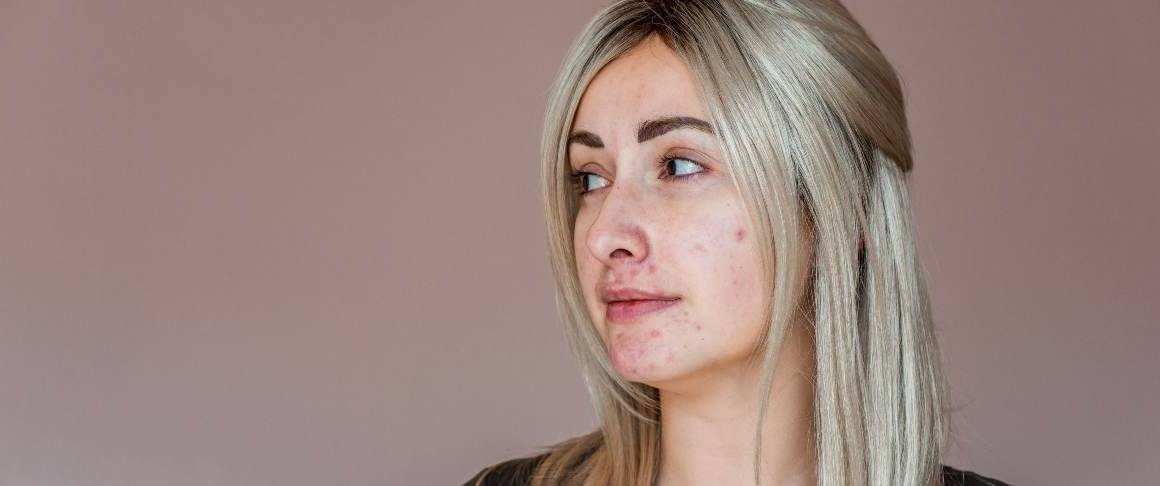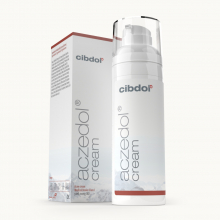What Does Acne on the Cheeks Mean?
Published:
Acne is a common skin condition that affects people of all ages. While acne can pop up anywhere on the body, it frequently develops on the face - including the cheeks. But what does it mean when you get acne on your cheeks?
Contents:
- What Causes Acne on the Cheeks?
- What Does Acne on the Cheeks Mean?
- Acne on the Cheeks Treatment
- FAQs About Cheek Acne
- Summary
- What's the difference between acne on the cheeks vs. jawline?
- Why do I only break out on my left or right cheek?
- Can cheek acne be a sign of an allergic reaction?
- How do you treat acne along the cheekbones vs. lower cheeks?
- What ingredients should I avoid if I have acne on my cheeks?
- Can birth control help or worsen cheek acne?
- What natural remedies are best for reducing cheek acne?

What Causes Acne on the Cheeks?
Acne occurs when dead skin cells, oil, and bacteria clog the hair follicles on your skin. This leads to different types of acne lesions, like whiteheads, blackheads, pimples, and cysts. There are several factors that can contribute to acne on the cheeks specifically.
Hormonal Changes
Hormonal fluctuations are a major trigger for acne on the cheeks and jawline. During puberty, hormone levels rise which causes the sebaceous glands to produce more oil. Adults also experience hormonal breakouts related to menstrual cycles, pregnancy, and menopause.
The androgens, including testosterone, increase oil production and change the development of skin cells. This hormonal activity causes clogged pores and inflammation. Hormonal acne along the cheeks and jaw is commonly seen in women due to the cyclical nature of hormones. However, men can also deal with hormonal pimples during puberty.
Stress
Stress causes increased cortisol production, which triggers excess oil production and inflammation. Chronic stress leads to chin and cheek breakouts for many people. Studies show that students and shift workers tend to have acne flare ups during stressful periods due to disrupted circadian rhythms.
Friction & Irritation
The sensitive skin on your cheeks is prone to clogging and irritation from environmental factors. For example, resting your face on your hands or rubbing your cheeks frequently can obstruct follicles. Talking on the phone, sustained pressure from glasses, and rubbing your face with towels or pillowcases can also lead to cheek acne.
Certain hair and skin care products can clog pores and cause breakouts too. Think heavy creams, thick sunscreens, and greasy makeup. Make sure to wash your face thoroughly at the end of the day to prevent cheek acne.
Poor Diet
Research indicates that certain dietary factors like dairy products, carbohydrates, chocolate, and whey protein can trigger inflammatory skin conditions. Eating lots of processed and sugary foods leads to increased insulin levels, which causes acne.
A poor diet creates an imbalance of vitamins, minerals, and healthy fats needed for skin health. Getting proper nutrition with vegetables, fruits, lean proteins is key for clear skin. Staying hydrated also helps prevent clogged pores.
What Does Acne on the Cheeks Mean?
It’s Usually Hormonal
If the acne is predominantly on the cheeks and jawline in adults, it typically indicates hormonal fluctuations are the culprit. Cyclical breakouts on the lower face point to changing estrogen and progesterone levels.
Acne mechanica from irritation and clogged pores tends to show up randomly. Hormonal acne usually follows a pattern and is concentrated along the chin, jaw, and cheek area.
It Can Be a Reaction to Products
Sometimes acne concentrated on the cheeks signals a reaction to hair or skin care. Shampoos, conditioners, and styling products that migrate to the face can cause clogged pores and irritation.
The same goes for thick moisturizers and oils applied to the cheeks. Spot treating pimples with harsh ingredients can actually provoke more cheek acne for sensitive skin types. Evaluate your regimen if the acne is isolated to the cheek area.
It May Relate to Sleep Habits
Sleeping on dirty pillowcases night after night can obstruct pores along the cheeks and lead to breakouts. Rubbing your face constantly into a pillow can also irritate follicles. Changing pillowcases 1-2 times per week can help minimize cheek acne.
Sleeping on your side or stomach increases contact between your face and pillow. Stomach sleepers tend to rest half their face in the pillow, so more acne develops on that side. Try switching to a clean towel each night.
It Can Signal Food Sensitivities
Localizing breakouts on the cheeks can potentially indicate food allergies or intolerances. Dairy, eggs, wheat, and chocolate are common acne triggers. The cheeks are sensitive, so they may react strongly to inflammatory foods in the diet.
Keeping a food journal is helpful to identify any links between your meals and cheek acne. Eliminating suspect foods for a few weeks helps you determine which cause clogged pores or inflammation.
Acne on the Cheeks Treatment
Treating acne on the cheeks requires a multi-pronged approach focused on hormonal balance, gentle skin care, and reducing inflammation. Here are some tips for clearing up cheek acne:
Balance Hormones
If hormonal imbalance is the root cause, then hormonal interventions are key for treating cheek acne. Birth control pills, spironolactone, cortisol blockers, and supplements support hormonal balance from within.
Adapalene and tretinoin are topical retinoids that can help with hormonal acne as well. Retinoids unclog pores, control oil, and have anti-inflammatory effects. They are approved for over-the-counter use and require a prescription.
Cleanse and Moisturize Gently
Use a non-comedogenic facial wash no more than twice daily. Overcleansing irritates the skin and makes cheek acne worse. After cleansing, apply a lightweight, oil-free moisturizer. Select water-based serums and creams with hyaluronic acid to hydrate without clogging pores.
Only use toners containing witch hazel or glycolic acid 2-3 times per week. They can help control oil and exfoliate dead skin cells. Avoid scrubbing or picking pimples as it causes more inflammation.
Spot Treat with Topicals
Benzoyl peroxide, salicylic acid, and sulfur contain antimicrobial and anti-inflammatory properties to unclog pores and calm redness. Look for spot treatments containing 2-5% concentrations.
Dab a small amount directly on pimples once or twice daily. Take care using harsh ingredients on sensitive cheek skin. Limit contact with unaffected areas to avoid dryness.
Consider Professional Treatments
For moderate to severe acne, visiting a dermatologist is recommended. They can prescribe stronger topical treatments and oral medications. Professional procedures like photodynamic therapy, chemical peels, cortisone shots, and laser resurfacing can clear stubborn cheek acne.
Some patients with severe acne benefit from isotretinoin capsules for long-term remission. But this strong oral retinoid has serious side effects to weigh. Seek medical guidance to determine if it makes sense for your case.
Lead a Healthy Lifestyle
There are several lifestyle measures that support clear skin from within. Get 7-9 hours of quality sleep per night and change pillowcases frequently. Manage stress levels through exercise, meditation, yoga, etc. Stay hydrated and limit dairy, sugar, and refined carbs.
Adding probiotics, omega-3s, zinc, and antioxidants through whole foods and supplements can reduce inflammation too. Boost collagen formation with vitamin C and skin-enhancing peptides.
FAQs About Cheek Acne
Here are answers to common questions about acne on the cheeks:
Does cheek acne go away on its own?
It depends on the cause. Mild breakouts from stress, diet, or products may clear up over a few weeks with proper care. Persistent acne related to hormones or genetics usually requires treatment to prevent scarring. Visit a dermatologist if it doesn’t improve.
Do I pop cheek pimples?
No, never pop pimples as it pushes the infection deeper and leads to red, swollen lesions. Popping can worsen acne scarring too. Use a targeted spot treatment and let the blemish heal naturally. Cover large whiteheads with a hydrocolloid patch instead.
Should I stop wearing makeup with cheek acne?
Not necessarily, but select non-comedogenic options free of pore-clogging ingredients. Use an oil-free primer and water-based foundation with salicylic acid. Powder products like mineral makeup and blush are less likely to exacerbate acne.
How can I cover up cheek acne?
After cleansing and moisturizer, use a color correcting primer to neutralize redness. Spot conceal with a sheer, non-comedogenic concealer using clean fingers or brush. Set with loose mineral powder and avoid applying base makeup directly over active breakouts.
How do you treat painful cystic acne on cheeks?
Severe cysts require professional treatment to avoid scarring. Make an appointment with your dermatologist for a cortisone injection to immediately reduce swelling and discomfort. Prescription oral antibiotics and retinoids help prevent future cystic breakouts too.
Summary
Acne on the cheeks is often due to fluctuations in hormones, irritation from hair and skin products, poor diet, stress, and sleep habits like rubbing on pillowcases. Local breakouts tend to indicate sensitivity to specific triggers.
While mild cheek acne may clear up with over-the-counter remedies, moderate to severe cases usually require prescription medications or in-office treatments. A combination approach addresses all causes for the best results.
Seeing improvements can take 4-6 weeks, so consistency is key when treating acne on the cheeks. Create a simple regimen of gentle cleansing, oil-free moisturizing, and proven anti-acne ingredients. Lifestyle measures like a skin-friendly diet and pillowcase hygiene further support clear, healthy skin.
What's the difference between acne on the cheeks vs. jawline?
Acne along the jawline is primarily hormonal and related to fluctuations in androgens. Cheek acne can be hormonal too but also frequently results from irritation, pressure on the skin, allergies, and poor diet. Jawline breakouts tend to recur monthly while cheek acne may be sporadic.
Why do I only break out on my left or right cheek?
Sleeping on one side of your face night after night can cause acne to localize on that cheek. Phone use, resting your face on your hand, and hair products can also lead to one-sided breakouts if the irritation is always on the same cheek. Ensure you cleanse properly and change pillowcases to prevent uneven acne.
Can cheek acne be a sign of an allergic reaction?
Yes, acne mainly concentrated on the cheeks can potentially signal an allergy to hair, skin, or food products. Notice if the breakouts worsen after using certain makeup, lotions, or eating foods like dairy and whey. An allergist can help identify the source through testing.
How do you treat acne along the cheekbones vs. lower cheeks?
Acne higher on the cheeks and cheekbones is often due to makeup and hair products migrating downward. Try a mineral powder foundation instead of liquid formulas. Also, avoid applying blush and bronzer right on top of active breakouts. Low cheek acne tends to be hormonal, so look into retinoids and spironolactone.
What ingredients should I avoid if I have acne on my cheeks?
Steer clear of potential irritants like fragrances, menthol, peppermint, eucalyptus, and alcohol in products. Ditch thick creams or oils that may clog pores - go for a gel-based moisturizer instead. Limit coconut oil and cocoa butter around breakouts. And cut back on dairy, sugar, and simple carbs.
Can birth control help or worsen cheek acne?
Birth control can either improve acne or trigger breakouts, depending on the formulation. Pills containing estrogen and progesterone often clear up hormonal acne. However, androgen-dominant progestins like levonorgestrel can make cheek acne worse. Speak to your gynecologist about the best options.
What natural remedies are best for reducing cheek acne?
Tea tree oil, green tea, aloe vera, and honey packs contain antimicrobial benefits to help clear breakouts. Calendula, chamomile, and oatmeal soothe redness. Turmeric, oregano oil, and probiotics fight inflammation. And staying hydrated, reducing stress, and getting sunlight all support clear skin.










